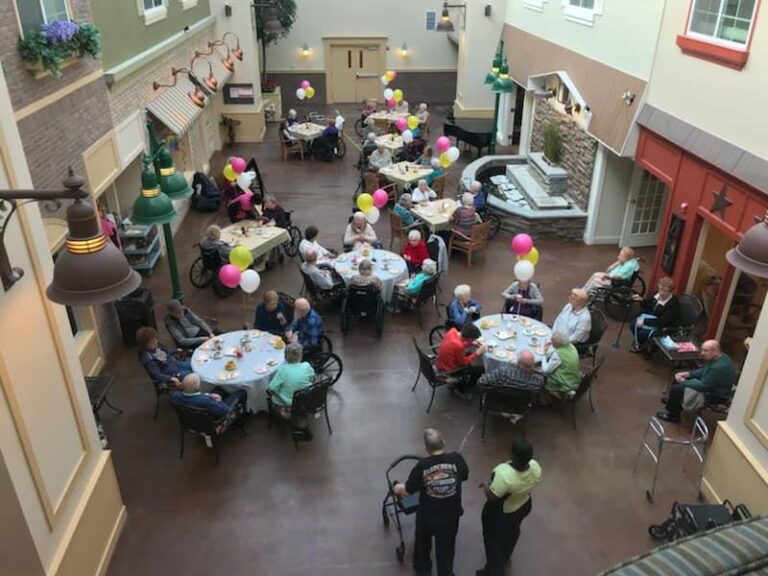Pricing & Availability: 586-838-5900

Your loved one’s move to an assisted living facility in Sterling Heights, MI, makes family connections more important than ever. Research proves that friends and family’s presence is significant to residents’ emotional and mental well-being. Their comfort and support matter greatly during this most important life change.
Staying connected might feel challenging at first. Modern technology and good communication channels help families keep meaningful relationships strong. Video calling platforms and family activities offer many ways to encourage these vital bonds.
Understanding Your New Role
Family dynamics undergo significant changes when you move a loved one to an assisted living. Research shows that family members still play vital roles by visiting, supporting and providing emotional support. Residents see their family’s involvement as a ‘blessing’ and feel proud to maintain these relationships.
Your role changes from a hands-on caregiver to someone who provides emotional support and advocacy. Most family caregivers build moderate-to-high trust with care professionals, especially when family-staff communication works well. Building this trust takes time and needs clear expectations from everyone involved.
Your evolving role includes these vital aspects:
- Communication Bridge: Build strong relationships with staff members when you greet them by name and recognize their work. Care planning meetings and regular updates help you stay informed about your loved one’s condition.
- Trusted Support: You still have a powerful voice in care quality oversight. The care team needs to know your loved one’s priorities and history. Studies show that spouses and women participate more in family-staff communication and visits.
- Quality Monitor: Tell staff promptly about any changes you notice in health or behavior. Research shows families often spot major health changes first and share this vital information with caregivers.
Strong family-staff relationships depend on:
- Clear communication about roles and expectations
- Trust-based interactions
- Family-centered approaches to care
- Regular participation in care decisions
Note that visit patterns depend on how close you live and how long your loved one has stayed. Families in rural areas report less involvement, which makes planning regular visits more important. This transition period needs to focus on protecting your loved one’s identity through shared efforts with staff.
Creating Meaningful Connections
Family time substantially affects residents’ well-being. Research shows that 75% of residents get regular visits from family members and children make up 50.3% of these visitors. Studies prove that meaningful interactions improve emotional and mental health. Residents with strong family bonds experience:
- Better Social Life: Residents spend about 75 minutes each day with family members
- Higher Care Standards: Better feeding assistance and overall care relate directly to family’s help
- Less Isolation: Regular family visits help prevent loneliness and lower the risks of dementia and other health issues
These connections matter beyond routine visits. About 76% of family caregivers stay in touch with their loved ones weekly. Residents take part in various personal activities with their families, from simple talks to fun games.
Special occasions offer perfect moments to deepen family bonds. Birthday celebrations, anniversaries and holidays create memories through shared experiences. These events let residents keep their cherished traditions with their families.
Here’s how to make family involvement count:
- Focus on quality interactions rather than quantity
- Share stories and reminisce about past experiences
- Participate in community events together
- Stay connected through different channels
Research confirms that steady family involvement helps residents feel more capable and successful in their relationships. Thoughtful planning and dedicated time help families create meaningful experiences that enrich their loved one’s life.
Supporting Your Loved One’s Independence
Research shows that resident autonomy relates directly to better mental health and life satisfaction.
- Balancing Support and Self-Reliance
Social relationships significantly impact resident well-being. Studies reveal that 75% of adults over 50 want to stay independent in their living environment. Family members should:
- Help only when needed
- Honor their priorities
- Keep communication lines open
- The Family’s Supporting Role
Residents with strong family connections need fewer co-resident relationships. Family members still play a vital role by:
- Supporting community activity participation
- Helping build new friendships
- Maintaining connections while respecting space
- Helping with technology to stay connected
Finding the Right Balance
Family involvement is the life-blood of successful assisted living experiences in Sterling Heights, MI. You play a vital role as you change from direct caregiving to become an essential supporter, communicator and advocate for your loved one’s well-being.
Your role in supporting independence doesn’t mean stepping back completely. The right balance between staying connected and respecting your loved one’s autonomy makes all the difference. Your presence and support create an environment where your family members can thrive while maintaining dignity and self-reliance.
The assisted living experience brings changes and challenges alongside opportunities for meaningful connection and growth. Regular visits, special celebrations and daily check-ins make the most important difference in your loved one’s life. To learn more about our senior community, My Doctors Inn and how we can help you stay involved in your loved one’s life, contact us at (586) 838-5900.





